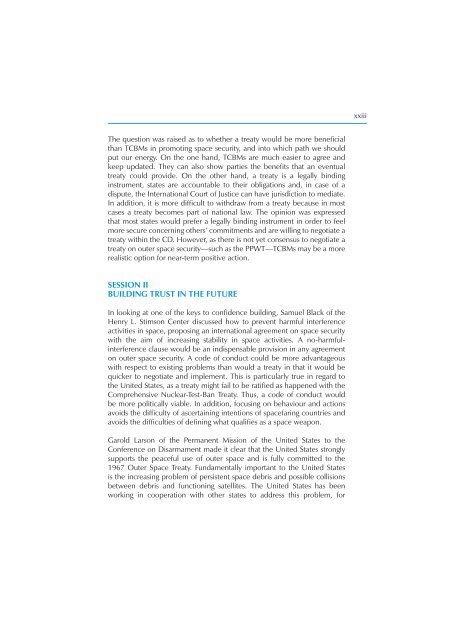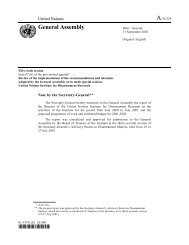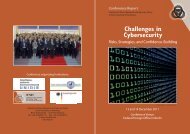Security in Space The Next Generation - UNIDIR
Security in Space The Next Generation - UNIDIR
Security in Space The Next Generation - UNIDIR
Create successful ePaper yourself
Turn your PDF publications into a flip-book with our unique Google optimized e-Paper software.
<strong>The</strong> question was raised as to whether a treaty would be more benefi cial<br />
than TCBMs <strong>in</strong> promot<strong>in</strong>g space security, and <strong>in</strong>to which path we should<br />
put our energy. On the one hand, TCBMs are much easier to agree and<br />
keep updated. <strong>The</strong>y can also show parties the benefi ts that an eventual<br />
treaty could provide. On the other hand, a treaty is a legally b<strong>in</strong>d<strong>in</strong>g<br />
<strong>in</strong>strument, states are accountable to their obligations and, <strong>in</strong> case of a<br />
dispute, the International Court of Justice can have jurisdiction to mediate.<br />
In addition, it is more diffi cult to withdraw from a treaty because <strong>in</strong> most<br />
cases a treaty becomes part of national law. <strong>The</strong> op<strong>in</strong>ion was expressed<br />
that most states would prefer a legally b<strong>in</strong>d<strong>in</strong>g <strong>in</strong>strument <strong>in</strong> order to feel<br />
more secure concern<strong>in</strong>g others’ commitments and are will<strong>in</strong>g to negotiate a<br />
treaty with<strong>in</strong> the CD. However, as there is not yet consensus to negotiate a<br />
treaty on outer space security—such as the PPWT—TCBMs may be a more<br />
realistic option for near-term positive action.<br />
SESSION II<br />
BUILDING TRUST IN THE FUTURE<br />
In look<strong>in</strong>g at one of the keys to confi dence build<strong>in</strong>g, Samuel Black of the<br />
Henry L. Stimson Center discussed how to prevent harmful <strong>in</strong>terference<br />
activities <strong>in</strong> space, propos<strong>in</strong>g an <strong>in</strong>ternational agreement on space security<br />
with the aim of <strong>in</strong>creas<strong>in</strong>g stability <strong>in</strong> space activities. A no-harmful<strong>in</strong>terference<br />
clause would be an <strong>in</strong>dispensable provision <strong>in</strong> any agreement<br />
on outer space security. A code of conduct could be more advantageous<br />
with respect to exist<strong>in</strong>g problems than would a treaty <strong>in</strong> that it would be<br />
quicker to negotiate and implement. This is particularly true <strong>in</strong> regard to<br />
the United States, as a treaty might fail to be ratifi ed as happened with the<br />
Comprehensive Nuclear-Test-Ban Treaty. Thus, a code of conduct would<br />
be more politically viable. In addition, focus<strong>in</strong>g on behaviour and actions<br />
avoids the diffi culty of ascerta<strong>in</strong><strong>in</strong>g <strong>in</strong>tentions of spacefar<strong>in</strong>g countries and<br />
avoids the diffi culties of defi n<strong>in</strong>g what qualifi es as a space weapon.<br />
Garold Larson of the Permanent Mission of the United States to the<br />
Conference on Disarmament made it clear that the United States strongly<br />
supports the peaceful use of outer space and is fully committed to the<br />
1967 Outer <strong>Space</strong> Treaty. Fundamentally important to the United States<br />
is the <strong>in</strong>creas<strong>in</strong>g problem of persistent space debris and possible collisions<br />
between debris and function<strong>in</strong>g satellites. <strong>The</strong> United States has been<br />
work<strong>in</strong>g <strong>in</strong> cooperation with other states to address this problem, for<br />
xxiii








